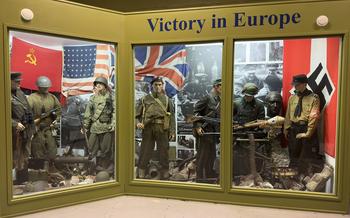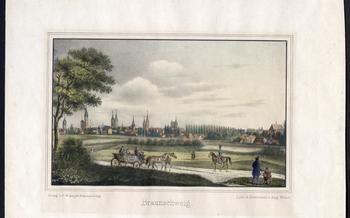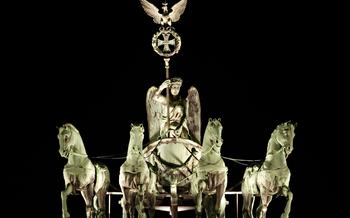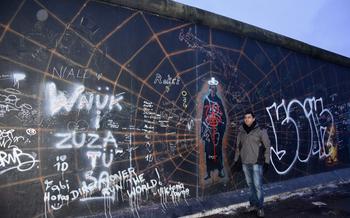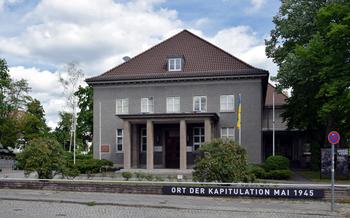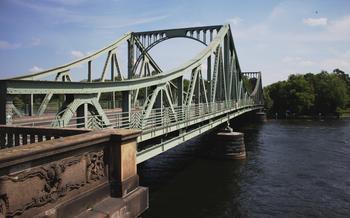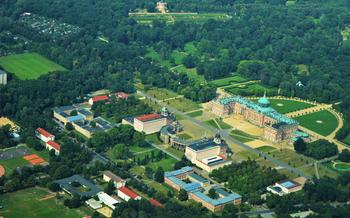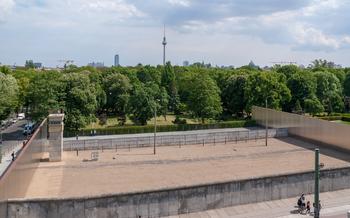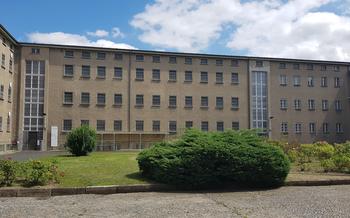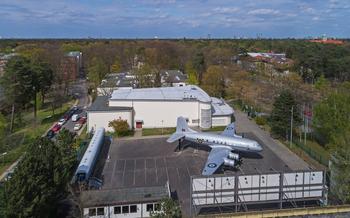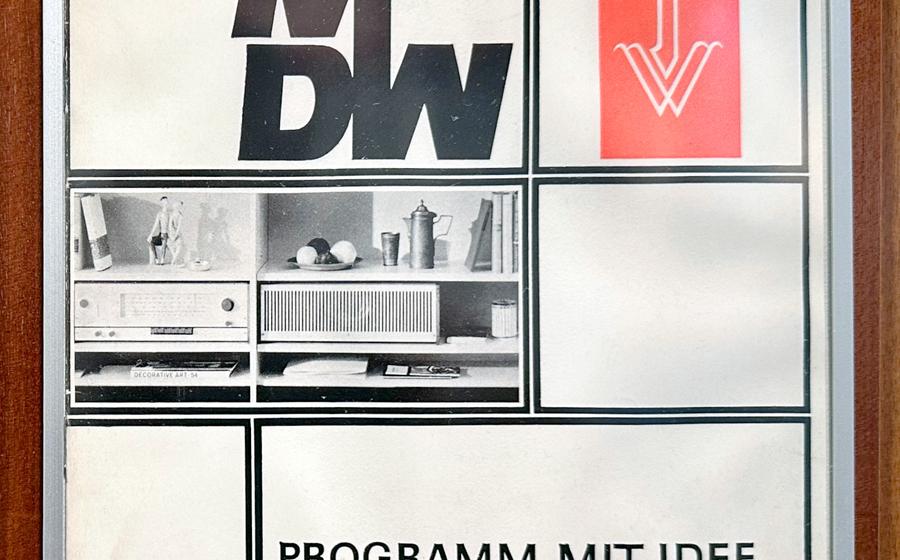
Zeitgeschichtliches Forum Leipzig
- Historical Significance
- Exhibitions
- Architecture
- Collections
- Educational Programs
- Special Events
- Location
- History of Leipzig
- Cultural Significance
- Personal Experience
- Practical Tips
- Historical Context
- Legacy of the GDR
- Insider Tip:
Historical Significance
The Zeitgeschichtliches Forum Leipzig is a modern history museum dedicated to preserving and presenting the history of Germany, particularly the period from 1945 to the present. The museum is housed in a former GDR museum and its unique and well-preserved features help to tell the story of Germany's complex past. With its diverse array of exhibits and meticulously curated displays, the Zeitgeschichtliches Forum Leipzig offers visitors a comprehensive and immersive understanding of Germany's recent history and its impact on the present.
Exhibitions
The Zeitgeschichtliches Forum Leipzig offers a wide range of permanent and temporary exhibitions that explore various aspects of German history, particularly the period from 1945 to the present. The museum's permanent exhibition, entitled "Leipzig 1989 - The Road to Peaceful Revolution," takes visitors on a journey through the events that led to the fall of the Berlin Wall and the reunification of Germany. Visitors can learn about the peaceful protests, the role of the Stasi secret police, and the impact of the peaceful revolution on German society.
Among the most notable exhibits in the museum are the Stasi prison cells, which provide a glimpse into the repressive nature of the GDR regime. Visitors can also see a section of the Berlin Wall, which once divided East and West Germany, and learn about the stories of those who tried to escape across it. The museum also features interactive exhibits and multimedia presentations that enhance the visitor experience, such as a virtual reality simulation of the peaceful revolution in Leipzig.
The museum is committed to presenting a balanced and objective perspective on history, and its exhibitions are curated by a team of experts in German history. The museum also hosts regular events and lectures featuring historians, journalists, and other experts who share their insights on German history and contemporary issues.
Architecture
The Zeitgeschichtliches Forum Leipzig occupies a striking building that reflects its historical significance and purpose. Constructed between 1982 and 1987, the building was initially designed to house the Museum of German History of the GDR. Its imposing Neoclassical facade, adorned with intricate carvings and sculptures, serves as a reminder of the GDR's architectural style. The building's design incorporates elements of socialist symbolism, including a prominent hammer and sickle motif, echoing the political ideology of the former East German regime.
Despite its historical symbolism, the building has undergone significant renovations since the fall of the GDR. In 1999, the museum's interior was extensively refurbished to create a modern and accessible space for exhibitions and events. The renovations aimed to preserve the building's historical character while adapting it to the needs of a contemporary history museum. The result is a unique blend of old and new, honoring the building's past while embracing its present role as a center for historical exploration and dialogue.
Located in the heart of Leipzig, the Zeitgeschichtliches Forum Leipzig stands among other significant historical landmarks. The proximity to the St. Thomas Church, where Johann Sebastian Bach served as cantor, and the Leipzig Opera, renowned for its rich musical heritage, further enhances the museum's cultural significance. The building's central location makes it easily accessible by foot or public transportation, inviting visitors to immerse themselves in Leipzig's vibrant history and cultural offerings.
Collections
The Zeitgeschichtliches Forum Leipzig houses an extensive collection of artifacts, documents, and photographs that shed light on Germany's contemporary history. These items provide a tangible connection to the past and offer visitors a deeper understanding of the events and personalities that have shaped the country. Among the most significant items in the collection are personal belongings of GDR citizens, such as clothing, furniture, and household objects. These everyday items offer a glimpse into the lives of ordinary people living in the GDR and provide insights into their experiences and struggles.
Another highlight of the collection is the Stasi files, which document the activities of the East German secret police. These files contain detailed information on individuals who were suspected of being dissidents or enemies of the state. They provide a chilling reminder of the oppressive nature of the GDR regime and the extent to which it monitored and controlled its citizens.
The museum's collection is not limited to physical objects. It also includes a vast number of photographs and documents that provide visual and written accounts of Germany's recent past. These materials include propaganda posters, newspaper articles, and personal letters, which offer valuable insights into the social, political, and cultural developments of the time.
The Zeitgeschichtliches Forum Leipzig's collection is a rich and diverse resource for researchers and educators. It is also a powerful tool for preserving and transmitting the memory of Germany's recent past to future generations.
Educational Programs
The Zeitgeschichtliches Forum Leipzig is committed to providing educational programs and activities for students of all ages. The museum offers guided tours that explore the museum's exhibitions and provide historical context and analysis. Visitors can also participate in workshops and lectures on a variety of topics related to German history, such as the GDR, the peaceful revolution of 1989, and the legacy of the Holocaust. These educational programs help students learn about German history in a hands-on and interactive way, and they also develop critical thinking skills and historical empathy. The museum also has outreach programs and partnerships with schools and universities, which help to bring the museum's educational resources to a wider audience.
Special Events
The Zeitgeschichtliches Forum Leipzig hosts a variety of special events and exhibitions throughout the year, offering visitors a unique opportunity to experience the museum in a different way. These events provide a platform for dialogue, discussion, and engagement with history and contemporary issues.
One of the most popular annual events is the "Long Night of the Museums," which takes place in May. During this event, the museum stays open until midnight and offers free admission, allowing visitors to explore the exhibitions at their leisure and enjoy live music, performances, and guided tours.
Another highlight is the "Day of German Unity," which is celebrated on October 3rd. On this day, the museum hosts special exhibitions and events that focus on the history of German reunification and the significance of this event for Germany and Europe.
These special events provide a unique opportunity for visitors to connect with the museum's exhibitions on a deeper level, learn more about German history, and engage in meaningful conversations with experts and fellow visitors.
Location
The Zeitgeschichtliches Forum Leipzig is conveniently located in the heart of the city center, making it easily accessible by foot, public transportation, or car. The museum is situated on Grimmaische Straße, just a short walk from the main train station (Leipzig Hauptbahnhof) and the city's central square, Markt. Visitors can easily reach the museum by taking tram lines 4, 7, or 12, which stop directly in front of the building. For those arriving by car, there are several parking garages and public parking lots available nearby, such as the Marktgalerie Parking Garage and the Petersbogen Parking Garage. To plan your route, you can use the interactive map provided on the museum's website or follow the clear signage throughout the city center.
History of Leipzig
Leipzig, a vibrant city in eastern Germany, boasts a rich and storied history that dates back to the Middle Ages. Originally a Slavic settlement, Leipzig gradually evolved into a significant trading center due to its strategic location at the intersection of several important trade routes. Over the centuries, the city flourished as a hub for commerce, attracting merchants and traders from across Europe. Leipzig's reputation as a center of trade and culture was further enhanced by the establishment of the University of Leipzig in 1409, which quickly became one of the most renowned universities in the Holy Roman Empire.
During the 19th century, Leipzig played a pivotal role in the development of the German Empire. In 1813, the city hosted the Battle of Leipzig, a decisive victory for the Allied forces against Napoleon Bonaparte. This victory marked a turning point in the Napoleonic Wars and paved the way for the establishment of a unified German state. Leipzig also emerged as a center of the German Enlightenment, with influential thinkers and writers such as Johann Wolfgang von Goethe and Friedrich Schiller frequenting the city's literary salons and theaters.
In the 20th century, Leipzig experienced both triumph and tragedy. The city was a major center of the German Revolution of 1918-1919, which led to the establishment of the Weimar Republic. However, Leipzig also suffered greatly during World War II, enduring heavy Allied bombing raids that destroyed much of the city's historic center. After the war, Leipzig became part of the German Democratic Republic (GDR) and was transformed into a major industrial center. The city played a key role in the peaceful revolution of 1989, which led to the reunification of Germany.
Today, Leipzig is a thriving city that has successfully blended its rich history with modern innovation. Visitors can explore the city's many historical landmarks, including the St. Thomas Church, where Johann Sebastian Bach served as cantor, and the Leipzig Opera, one of the oldest opera houses in Germany. Leipzig is also home to a vibrant arts and culture scene, with numerous museums, theaters, and galleries showcasing the city's rich cultural heritage.
Cultural Significance
The Zeitgeschichtliches Forum Leipzig holds immense cultural significance, enriching Leipzig's reputation as a city brimming with culture and history. As a hub for dialogue and understanding, the museum fosters connections between diverse cultures and generations. Its unwavering commitment to preserving and promoting Leipzig's rich cultural heritage has cemented its position as a beloved city landmark. Visitors are treated to a captivating journey through Leipzig's past, gaining insights into the city's cultural evolution and the forces that have shaped its unique identity. The museum's dedication to shedding light on Leipzig's history has garnered widespread recognition, making it a must-visit destination for culture enthusiasts and history buffs alike.
Personal Experience
As I stepped through the entrance of the Zeitgeschichtliches Forum Leipzig, I was immediately struck by the museum's modern and inviting atmosphere. The spacious galleries were filled with thought-provoking exhibits that transported me back in time. I was particularly moved by the Stasi prison cells, a chilling reminder of the oppressive regime that once ruled East Germany. The interactive exhibits and multimedia presentations kept me engaged throughout my visit, providing a deeper understanding of the events that shaped Germany's recent history.
The museum's commitment to presenting a balanced and objective perspective on history was evident in every exhibit. I appreciated the nuanced portrayal of the GDR, which highlighted both its positive and negative aspects. The museum also did an excellent job of explaining the peaceful revolution of 1989 and its impact on German society.
My visit to the Zeitgeschichtliches Forum Leipzig was a truly enriching experience. It gave me a deeper understanding of Germany's past and present, and I left the museum with a renewed appreciation for the country's resilience and determination. I highly recommend this museum to anyone interested in learning more about German history.
Practical Tips
-
For an optimal experience, allocate at least two to three hours for your visit to thoroughly explore the museum's exhibitions.
-
Plan your visit around the museum's opening hours, which are typically from 10 am to 6 pm on Tuesdays to Sundays. It remains closed on Mondays.
-
Consider purchasing tickets online in advance to avoid potential queues, especially during peak tourist seasons.
-
Take advantage of the museum's multilingual audio guides, available in English, German, French, Russian, and Spanish, for a more immersive and informative experience.
-
Guided tours are offered in English and German at specific times throughout the day. Check the museum's website or inquire at the information desk for schedules and availability.
-
The museum offers a cloakroom where you can store your belongings free of charge, allowing you to move around the exhibitions comfortably.
-
Enjoy a break at the museum's café, which serves refreshments and light meals, providing an opportunity to rest and reflect on what you have seen.
-
Remember to visit the museum's gift shop, where you can find a variety of souvenirs, books, and educational materials related to German history.
Historical Context
The Zeitgeschichtliches Forum Leipzig's exhibitions are set against the backdrop of Germany's tumultuous history from 1945 to the present. The museum explores the political, social, and economic factors that shaped this period and provides visitors with a deeper understanding of the events and phenomena that have influenced contemporary Germany.
The museum's exhibitions highlight the rise and fall of the German Democratic Republic (GDR), the peaceful revolution of 1989, and the challenges of German reunification. Visitors can learn about the ideological foundations of the GDR, its economic and social policies, and the everyday lives of its citizens. The museum also examines the GDR's relationship with the Soviet Union and its role in the Cold War.
The peaceful revolution of 1989 marked a turning point in German history and led to the reunification of East and West Germany in 1990. The museum explores the factors that led to the revolution, the role of civil society, and the challenges of integrating two very different societies.
Legacy of the GDR
The legacy of the GDR in contemporary Germany is complex and multifaceted. On the one hand, the GDR's collapse led to the reunification of Germany and the end of the Cold War, which were undoubtedly positive developments. On the other hand, the GDR's legacy also includes social and economic challenges that Germany continues to grapple with today.
One of the most pressing challenges is the issue of Stasi files. The Stasi, the GDR's secret police, kept extensive files on millions of citizens, containing information about their personal lives, political views, and activities. After the fall of the GDR, these files were opened to the public, and many people were shocked to learn about the extent of the Stasi's surveillance and repression.
The Stasi files have had a profound impact on German society. They have led to the exposure of former Stasi collaborators, the rehabilitation of victims of political persecution, and the shedding of light on the dark history of the GDR. However, the files have also caused pain and division, as people have had to confront the past actions of themselves and their loved ones.
Another challenge facing Germany is the issue of economic disparities between the former East and West Germany. The GDR's economy was centrally planned and inefficient, and after reunification, many industries in the East collapsed. As a result, unemployment and poverty rates in the East are still higher than in the West, and many people in the East feel that they have not been fully integrated into German society.
Despite these challenges, Germany has made significant progress in overcoming the legacy of the GDR. The country has established a vibrant democracy, a strong economy, and a diverse and open society. The Zeitgeschichtliches Forum Leipzig plays an important role in helping Germans to understand their past and to build a better future.
Insider Tip:
For an immersive experience, join a guided tour led by a former GDR citizen or a Stasi officer. These knowledgeable guides provide firsthand accounts of life in the GDR and offer unique insights into the museum's exhibits. They can share personal stories, answer questions, and help you understand the complexities of this period in German history from a personal perspective. Booking a guided tour in advance is recommended, especially during peak season, to secure your spot with one of these exceptional guides.
